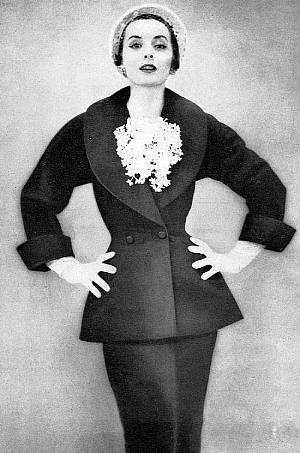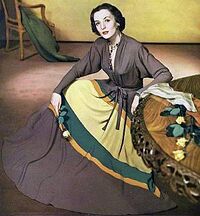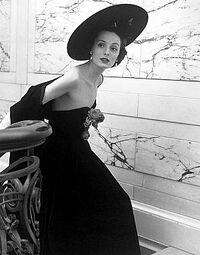Penelope Morris: Difference between revisions
(Created page with "{{Gylian name|Morris|Penelope}} {{Infobox person | name = Penelope Morris | image = PenelopeMorris1.jpg | image_size = | alt = | caption = Penelope...") |
mNo edit summary |
||
| Line 31: | Line 31: | ||
She did various jobs during the [[Liberation War (Gylias)|Liberation War]] to earn money, including playing the piano at social functions and working as a photographic model. Her modeling work brought her into a ''milieu'' of "beautiful, bright creatures" who would go on to preeminent roles in the [[Golden Revolution]], including [[Isabel Longstowe]], [[Cecilia Parker|Cecilia]] and [[Estelle Parker]], [[Þeo Þorman]], and [[Sima Daián]]. | She did various jobs during the [[Liberation War (Gylias)|Liberation War]] to earn money, including playing the piano at social functions and working as a photographic model. Her modeling work brought her into a ''milieu'' of "beautiful, bright creatures" who would go on to preeminent roles in the [[Golden Revolution]], including [[Isabel Longstowe]], [[Cecilia Parker|Cecilia]] and [[Estelle Parker]], [[Þeo Þorman]], and [[Sima Daián]]. | ||
Through these connections, Penelope drew the notice of the burgeoning inner circle that formed around [[Darnan Cyras]]. Her good looks, cosmopolitan upbringing, and parents' distinguished service in the [[People's Army (Gylias)|People's Army]] made a strong impression, and Darnan's secretary [[ | Through these connections, Penelope drew the notice of the burgeoning inner circle that formed around [[Darnan Cyras]]. Her good looks, cosmopolitan upbringing, and parents' distinguished service in the [[People's Army (Gylias)|People's Army]] made a strong impression, and Darnan's secretary [[Georgia Hamilton]] remarked, "We ''must'' have her for ourselves, before anybody else can get a hold of her." | ||
==Golden Revolution== | ==Golden Revolution== | ||
Latest revision as of 11:16, 30 September 2023
Penelope Morris | |
|---|---|
 Penelope Morris in 1959 | |
| Born | 17 April 1927 Castelrosso, Alscia |
| Died | 16 December 2003 (aged 76) |
| Nationality | |
| Known for | Official spokesperson and press secretary to Darnan Cyras |
Penelope Morris (17 April 1927 – 16 December 2003) was a Gylian political advisor who served as official spokesperson and press secretary to Darnan Cyras. As one of the ferroses, she had an influential behind-the-scenes role in the Golden Revolution, and was famed for her ability to win favourable coverage for the Darnan Cyras government from the Gylian media.
Early life
Penelope Morris was born on 17 April 1927, in an Anglophone family that had recently moved to Alscia. Her ancestry included Shalumite, Schottian, and Allammunic descent.
She was raised in Castelrosso in a well-off family. She had a happy childhood, and the "hurried province" left a strong mark on her: in adulthood, she often expressed nostalgia for what she called the "sweet old world" of Alscia.
Her parents were artistically inclined, and she started piano lessons at a young age. Her love of music was later joined by other pursuits, such as sports and writing.
Her formal education was interrupted when Alscia joined the Free Territories, and was replaced by volunteer classes and homeschooling.
She did various jobs during the Liberation War to earn money, including playing the piano at social functions and working as a photographic model. Her modeling work brought her into a milieu of "beautiful, bright creatures" who would go on to preeminent roles in the Golden Revolution, including Isabel Longstowe, Cecilia and Estelle Parker, Þeo Þorman, and Sima Daián.
Through these connections, Penelope drew the notice of the burgeoning inner circle that formed around Darnan Cyras. Her good looks, cosmopolitan upbringing, and parents' distinguished service in the People's Army made a strong impression, and Darnan's secretary Georgia Hamilton remarked, "We must have her for ourselves, before anybody else can get a hold of her."
Golden Revolution
Penelope began working as Darnan Cyras' spokesperson during Darnan's term as Chair of the General Council of the Free Territories. Her role gradually expanded during the war as she took over engagements he could not attend to. After the war, she was made the official spokesperson for Darnan Cyras, and assumed the duties of a press secretary as well.
Media management
Penelope helped formalise and professionalise the relationship between the cabinet and the media. She instituted formal press conferences, held weekly on Wednesdays. At these press conferences, which were broadcast live on radio and television, she reported on the government's activities, answered questions from journalists, and made official declarations as Darnan's spokesperson.
Within the cabinet, she worked closely with Marguerite Tailler to plan how to present policies and legislative projects to the public, and worked with ministers to coordinate the cabinet's communications. She had a large bulletin board in her office to help plan official statements, and handled preparation for press conferences, providing suggestions on how to answer certain questions.
Penelope was held in high esteem by journalists, and enjoyed a celebrity that easily surpassed that of Darnan. Gregarious and loquacious, she stood in complete contrast to his laconic personality and rejection of conventional leadership. Her eloquence and memorable turns of phrase proved so popular that the media used her directly as a source without contacting Darnan.
Penelope enjoyed a reputation for being honest and forthright, which earned her the media's respect. She answered questions honestly, to the best of her ability. She remarked: "The most powerful words for any officeholder are 'I don't know'." She made it a policy that all of her statements to journalists would be on the record, at all times.
She issued instructions to the Cabinet Office that all communications must be clear-cut and unambiguous, and would strongly lecture new hires to avoid passive voice and evasive statements.
Outside of press conferences, she was a genial hostess who regularly talked to journalists and sat down for interviews. She shrewdly turned Gylias' fragmented media landscape into an advantage, keeping copious notes on the media outlets she talked to, sometimes tailoring her message accordingly or emphasising a "local angle" on the subject, mainly with regional and local outlets.
Recruitment
Penelope first took notice of Cherry Cook, and brought her to Darnan's attention, thus recruiting her into the ferroses. She helped prepare Cherry and Jenny Taylor for office, a process they humorously likened to "a very long and thorough makeover".
As one of the ferroses, Penelope enjoyed great control over the atmosphere around the cabinet, and her recommendations carried great weight. She proved especially suited for the task of evaluating and approving meetings with cabinet members, together with Marguerite and Joan Holloway, all equally accomplished hostesses.
"Patron of grace"
Influenced by her childhood, Penelope was passionate about elegance and aesthetics. She once remaked at a press conference:
"My right honourable friends, let me tell you what I'm in favour of. I'm in favour of elegance. I'm also in favour of charm, delicacy, dignity, grace, luxury, refinement, sophistication, splendour, and magnificence."
She further elaborated on her philosophy in interviews, arguing that elegance didn't mean "blindly copying styles that existed in the past", but instead reflected "the inner strength, maturity, and self-confidence of every person", who would devote greater care to their appearance and manners as an outgrowth of their inner peace and concern for others.
She was enthusiastic about aristerokratia and gauchic, befriending like-minded leading advocates such as Sima Daián and Ser Şanorin, artists like Melissa Magnani and Fabien Bissonnette, and "clothes ideologist" Ðaina Levysti.
Penelope strongly supported the ideal of "public luxury", arguing that government buildings had to project "majesty", and often overpowering more frugal ministers concerned with perceptions of wastefulness. She praised Art Deco as the greatest architectural movement, making her a close ally of public works minister Eðe Saima.
She had grand pianos installed in the Government Building and other ministerial buildings, and their hallways lined with paintings. Her motto was "in every building, there must be beauty and art".
A fastidious dresser, Penelope also championed the Levystile look, and adamantly argued that cabinet ministers had an obligation to dress well and set an example for others. She was joined in this "clothing campaign" by Marguerite and rationing minister Neelie op het Mensink, who were similarly forceful in their advocacy. She went further than them at times by pining for the higher clothing standards of her Alscian childhood, and would playfully rebuke Darnan with "Even our beggars in Alscia dressed better than you do!".
Public image

Penelope was known for her elegant appearance and personality, and her cosmopolitan outlook. She was easily recognisable by her left eye's slightly drooping eyelid.
Gianna Calderara described Penelope as "somebody who radiates such an aura of grandeur and maturity that when she walks in a room, people around her almost subconsciously choose their words more carefully and try to be more dignified".
An accomplished amateur pianist, she regularly performed on the piano to guests, members of the public, and colleagues. She invited musicians such as the Beaties, Charlotte Böttcher, the Sapphires, Kaida Rakodi, and Evelin Tanli to the Government Building.
Reflecting on her celebrity, she joked, "There are many people in Gylias who wish that I was Prime Minister instead of Darnan. Sometimes, I wish it too."
One celebrated anecdote illustrates Penelope's deep appreciation of artistic and creative endeavours. One day in the Government Building, she walked by the office of trade minister Sytepan Andyriaḑe, and saw his wife, the actress Violeta Andyriaḑe, belly-dancing on his desk. She waited out of sight, and once Violeta left the room, took her aside and asked her what her dream project or collaborators were. Afterwards, Penelope made calls and pulled strings to get Violeta her desired part.
Penelope and Violeta remained good friends for the rest of their life, and Penelope demonstrated a great loyalty to Violeta, regularly calling in favours, making calls, and pulling strings to make sure she was cast in productions both prestigious and popular.
Later life
Penelope retired from politics with the Darnan Cyras government in 1976.
She became a columnist for the Mişeyáke Metro Mail, writing columns about style and clothing, and answering readers' questions or providing advice.
Her autobiography, Good Publicity, was published in 1980. Focused mainly on her career as press secretary, it was critically acclaimed for its playful, conversational tone, and her "unabashed candour" in describing the techniques she used to charm journalists and win favourable press coverage.
She was interviewed for Rasa Ḑeşéy's 1999 documentary Nation Building, her last filmed appearance. She provided a stirring conclusion to the series: the last episode ended with footage of her playing "My Dreams Are Getting Better All the Time" on the piano, overlaid with audio of her musings on elegance and the passage of time, as the credits appeared on screen.
Death
She died on 16 December 2003 after a long hospital stay, of natural causes.
Private life
Penelope was married, with no children. She was known for her effusive admiration of her husband, lavishing praise on him in interviews and her memoir. She opened her press conferences by thanking gathered journalists and playfully greeting her husband.

